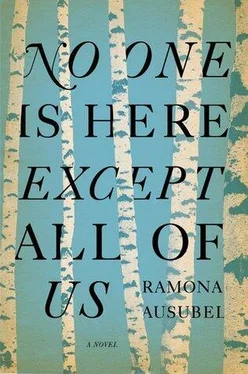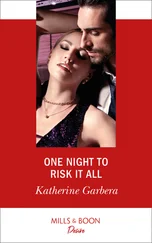“I do tatting lessons now,” she said. “You know, lace.”
“This baby is a son,” the banker corrected her.
“Oh, well, I do shooting lessons, too.” She cocked an imagined rifle.
Igor said, “I would like to learn to shoot.” But his father brushed the idea away, saying, “She can’t teach you, you’re too old. She would have needed to start when you were a baby.”
“To shoot?” Igor asked.
“To anything,” the banker replied.
The baby looked like a little old man with his crinkled face. People were certain that a baby born a little ugly in an old man sort of way would grow up to do great things. It was a story we could not remember. Something about already having his father’s soul, or about how ugly is really beautiful turned inside out, or wrinkles are lucky.
When the baby was set to celebrate his four-day birthday, the banker’s wife opened her eyes and she stretched out her arm and she tried to remember the dream she was having. There were fruit trees and there were rivers, but the rest was lost. She looked over at her husband and smiled at the pillow lines on his cheek. She looked down at her son, and she screamed. He was just sticking out from under his father’s body, and he was blue. Sometime in the night, there had been rolling and turning and the little, perfect, slightly-ugly-in-a-good-way baby had been suffocated by the weight of his father.
Igor heard the scream and came running. Fault — he had left the baby, he had not kept watch — tapped him on the back. The banker woke up and saw what he had done. Igor’s mother pulled the baby out from under her husband and she put his dead mouth on her breast and watched as the milk drained down her body, purposeless. Igor had no way to help. His hands were hunks of flesh, his eyes were marbles rolling away, his heart was a rhythmless drum. The unbidden wish for a warm hand, a steady hand, placed quietly on his back, made his eyes sting.
“Wake up, wake up. You’re four days old today. You are the baby I had. Wake up,” his mother said. She seemed certain that if she could say enough, if she could construct the argument, God would change his mind. There was no shortage of reasons — the baby’s size, his future entirely unchipped, pristine. Igor’s father put his hands on the baby’s back while it did not nurse. He cried himself out. He tried to hold his breath and die but he kept gasping. His body kept him alive despite all his best efforts.
Igor felt God close his curtains and leave the banker’s family alone on the earth’s crust. Igor felt everything slow down. His blood, his breath, his thoughts. He felt like he was melting. “Am I awake?” he asked, which made his father cry yet harder. When his mother looked at him, her eyes were churned pools, silt and mud rising from the bottom. She looked away, disgusted by herself, by being seen that way.
Slowly, the other living children gathered in a circle around their parents. They were a wall keeping the world out of this moment. No birdsong, no blown wind, no water dropped from the sky, no evidence of life. They said the prayers they knew and the prayers they did not. Igor closed his eyes and told his parents, “I am so tired,” and he lay down on the floor.
And outside in the world, people kept trading money for fruit and fruit for hammers, knowing nothing of the death of the first new life or what would occur because of it. In everyone’s root cellars were congratulatory canned apples and sympathetic canned potatoes, and we would need every jar.
Kayla sent Hersh, uncertain, uneasy, but obedient Hersh, door-to-door, measuring, inspecting, trying to win over any marriageable young man inside. He brought hard candies in foil wrappers, cookies in wax paper. Small sculptures of horses for the boys, nice wooden spoons for the mothers and strong tea for the fathers. He remarked on the beauty his girl was turning into.
The fathers of sons said, “She’s a lovely girl.”
Hersh said, “Lovelier every day.”
The mothers of sons said, “It wouldn’t be so bad to let her grow up a little.”
Hersh said, “She grows so much we can hardly keep up. Growing is not the problem.” The mothers and fathers of sons accepted the chocolates and the teas and the wooden spoons.
They chatted about the progress of our existence, the state of this and that. The beets were on the soft side, but the potatoes were delicious; money was not as plentiful as anyone had hoped; the weather, the weather, the weather. When could we look forward to some sun? “We will become aquatic soon,” Hersh joked.
When he left, the fathers of sons said, “Thank you for the gifts. Your daughter will no doubt find a good husband, in time.”
“I am trying to do the right thing. I’m trying to do as my wife asks,” Hersh said, wanting to explain, to apologize, to find a way of loving simultaneously everything he loved: me in my growing, Kayla in her mothering, the new world asking questions no one knew how to answer yet.
“In this, the beginning of the world, I think we’re all trying to do as our wives ask,” the fathers of sons assured.
Hersh kicked a rock down the cobbles, enjoying the tink it made against each set stone. Free rock on caught rock, showing off. At the banker’s house, the windows were draped in black fabric, which caused Hersh’s heart to fall in his chest. He knew what black fabric over the windows meant. Death, the idea of death, struck him across the head like a punch. No one had died yet in the new world. We had lost nothing we ourselves had not pushed out. He stood on the stoop’s reed mat, cleaned his boots but did not knock. A loss so final seemed nearly impossible to him, almost absurd. The End, he said to himself, and it did not make sense. He examined the hair on the backs of his hands, considered how air felt in his nose. Hersh was alive, every bit of him was so alive. Losing one part made sense — his arms could die, his skin could fall off — but not everything. Not at once.
The door was cold and solid when Hersh leaned his forehead against it. What was lost was locked inside — everything beyond was blind and dumb to the fact of it. All it took was a door, and the day cooed along without sadness. Hersh imagined the banker’s family in the dark, inside — which person he should erase from the picture he did not know — standing around a nest of eggs, incubating the hot yellow yolks of sorrow within. Soon, the eggs would hatch, and whatever creature sadness had made would fly out through the opened door.
Am I the one to let them out? Hersh asked. He knocked, curiosity enough to propel his knuckles. The stranger opened a seam in the door, her white face framed like a portrait. “I saw the curtains,” Hersh said.
“Thank you for your concern. It’s the baby. He died in his sleep.” The eggs cracked. Our beautiful world waited to meet grief for the very first time. The wind changed, moved through Hersh’s clothes like a ghost. His skin cooled.
I was supposed to be ready at any moment to become a screeching infant or a dying old woman, a wife. Except I was not ready for any of that, not ready or prepared. Aware of the possibility. Alert at best.
When Hersh’s husband-finding mission had commenced, I escaped through the drizzling world to the river. I took my wash and my books and I went to a bend where the willows grew up high and the mud was red. On the opposite bank, I could almost make out the shapes of two deer drinking. I soaked and wrung my dresses and my uncle’s underwear. I soaked and wrung Kayla’s stockings. I let the sweat of their bodies wash downstream. I took my clothes off and got into the river, which was cold and smooth with silt. As I washed, I felt the new shapes my body made. Little hills on my chest, my waist deeper than before. How did it know what to do? My skin tightened in the cold.
Читать дальше












